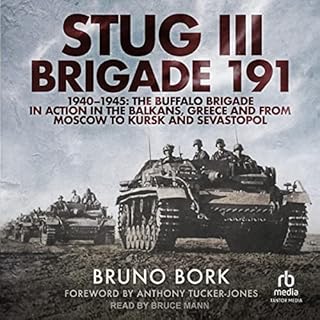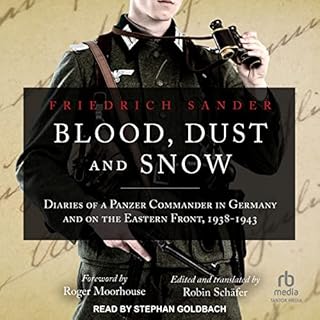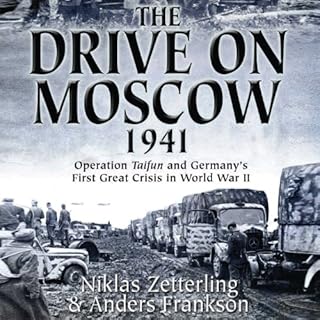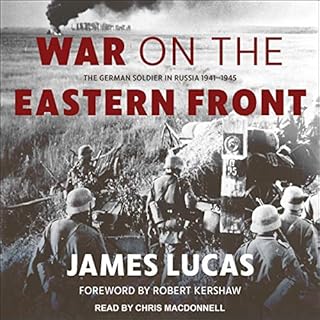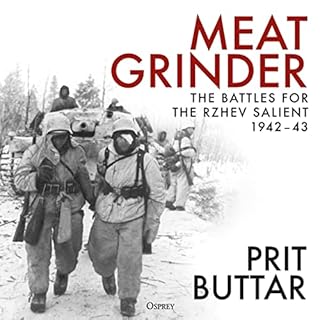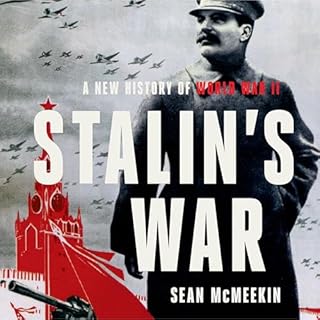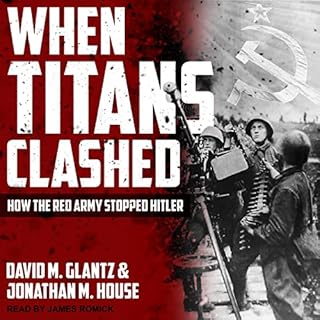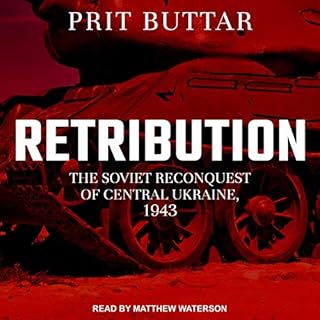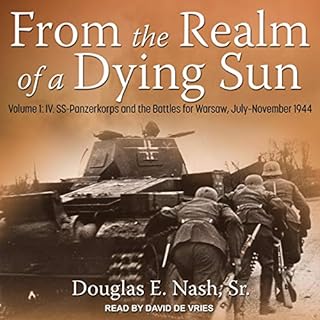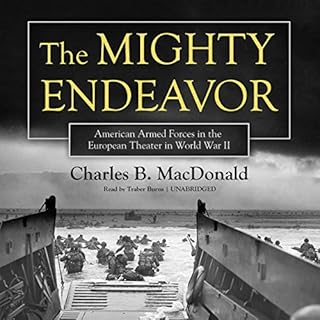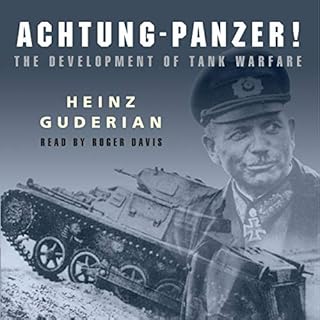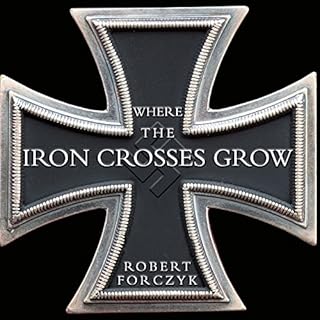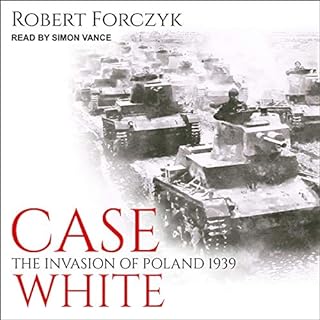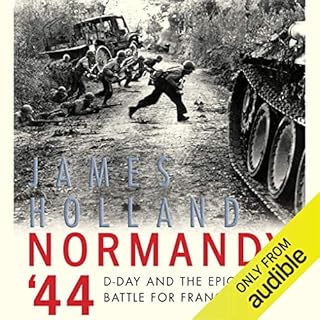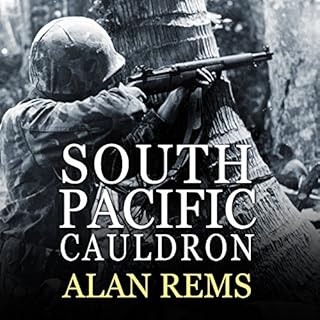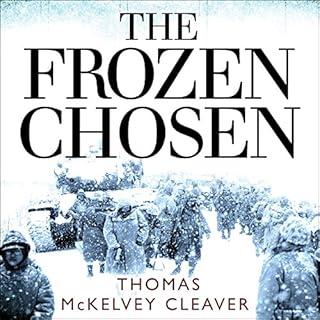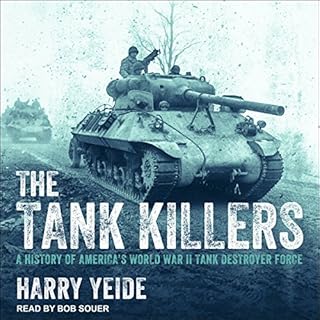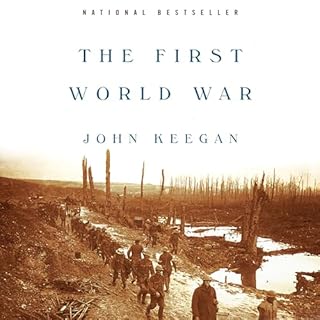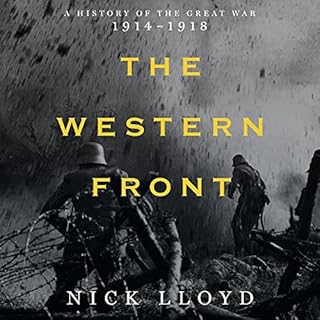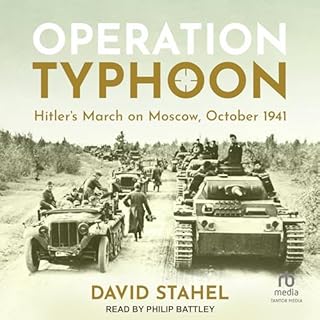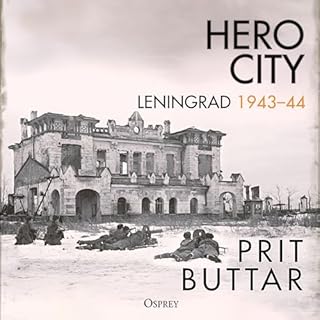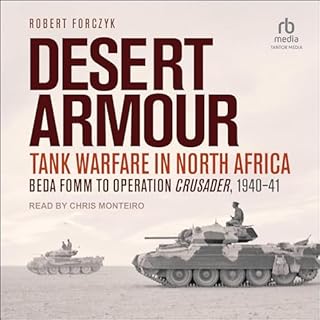
Blitzkrieg
From the Ground Up
Failed to add items
Add to Cart failed.
Add to Wish List failed.
Remove from wishlist failed.
Adding to library failed
Follow podcast failed
Unfollow podcast failed
 Prime members: New to Audible?
Prime members: New to Audible?Get 2 free audiobooks during trial.
Buy for $17.19
No default payment method selected.
We are sorry. We are not allowed to sell this product with the selected payment method
-
Narrated by:
-
Roger Clark
About this listen
The successes of the German Blitzkrieg in 1939-41 were as surprising as they were swift. Allied decision-makers wanted to discover the secret to German success quickly, even though only partial, incomplete information was available to them. The false conclusions drawn became myths about the Blitzkrieg that have lingered for decades.
It has been argued that German victories in the early part of the war rested less upon newly developed tanks and aircraft and more on German military traditions: Rather than creating a new way of war based on new technology, the Germans fitted the new weapons into their existing ideas on warfare. The conduct of German soldiers, particularly the lower-ranking men, on the battlefield was at the core of the concept, and German victories rested upon the quality of the small combat units.
This book focuses on the experience of the enlisted men and junior officers in the Blitzkrieg operations in Poland, Norway, Western Europe, and Russia. Military historian Niklas Zetterling explores how they operated, for example, how a company commander led his tanks, how a crew worked together inside a tank, and the role of the repair services. The author fits these narratives into a broader perspective to give the listener a better understanding of why the Germans were so successful in 1939-41.
©2017 Niklas Zetterling (P)2019 TantorListeners also enjoyed...
-
StuG III Brigade 191, 1940-1945
- The Buffalo Brigade in Action in the Balkans, Greece and from Moscow to Kursk and Sevastopol
- By: Bruno Bork, Anthony Tucker-Jones - foreword
- Narrated by: Bruce Mann
- Length: 10 hrs and 19 mins
- Unabridged
-
Overall4 out of 5 stars 7
-
Performance4 out of 5 stars 7
-
Story4 out of 5 stars 7
Based on their experiences during the First World War, the Reichswehr decided that the infantry support gun of the future should be an armored, motorized vehicle: the Sturmgeschütz III. The weapon was used in the 'fire brigade role' at hotspots along the Front, where it was much feared by enemy forces. This book tells the tale of Brigade 191, aka the 'Buffalo Brigade', who used the Sturmgeschütz III as they took part in Operation Barbarossa in the Ukraine, saw action during the fight for Greece and were deployed to the areas of heaviest fighting in the campaign against the Soviet Union.
-
2 out of 5 stars
-
Ruined by awful narrator
- By MortonC on 01-19-24
By: Bruno Bork, and others
-
Blood, Dust and Snow
- Diaries of a Panzer Commander in Germany and on the Eastern Front
- By: Friedrich Sander, Robin Schafer - editor translator, Roger Moorhouse - foreword
- Narrated by: Stephan Goldbach
- Length: 15 hrs and 23 mins
- Unabridged
-
Overall4.5 out of 5 stars 64
-
Performance4.5 out of 5 stars 55
-
Story4.5 out of 5 stars 55
The war on the Eastern Front from 1941 to 1945 was the bloodiest combat theater in the bloodiest war in history. Oberleutnant Friedrich Wilhelm Sander experienced this bloodshed firsthand when serving with the 11th Panzer-Regiment. This regiment made up the core of the 6th Panzer-Division, one of Hitler's top armored formations, which was involved in most of the major campaigns on the Eastern Front; campaigns such as Operation Barbarossa and Operation Winter Storm.
-
4 out of 5 stars
-
Great account of a light tank commander during WWII, BUT
- By William T. on 09-16-23
By: Friedrich Sander, and others
-
The Drive on Moscow, 1941
- Operation Taifun and Germany’s First Great Crisis of World War II
- By: Niklas Zetterling, Anders Frankson
- Narrated by: Dave Courvoisier
- Length: 8 hrs and 49 mins
- Unabridged
-
Overall4 out of 5 stars 97
-
Performance4 out of 5 stars 88
-
Story4 out of 5 stars 85
At the end of September 1941, more than a million German soldiers lined up along the frontline just 180 miles west of Moscow. They were well trained, confident, and had good reasons to hope that the war in the East would be over with one last offensive. Facing them was an equally large Soviet force, but whose soldiers were neither as well trained nor as confident. When the Germans struck, disaster soon befell the Soviet defenders.
-
4 out of 5 stars
-
Add the maps, lose the accents
- By Carrick on 07-03-14
By: Niklas Zetterling, and others
-
Panzer General
- Heinz Guderian and the Blitzkrieg Victories of WWII
- By: Kenneth Macksey
- Narrated by: Jonathan Cowley
- Length: 12 hrs and 30 mins
- Unabridged
-
Overall4.5 out of 5 stars 53
-
Performance4.5 out of 5 stars 45
-
Story4.5 out of 5 stars 45
Kenneth Macksey's highly regarded biography of Generaloberst Heinz Guderian gives clear insight into the mind and motives of the father of modern tank warfare. Panzer General shows Guderian as a man of ideas equipped with the ability to turn inspiration into reality. A master of strategy and tactics, he was the officer most responsible for creating blitzkrieg in World War II.
-
2 out of 5 stars
-
Terrible narration/pronunciation
- By Amazon Customer on 01-23-22
By: Kenneth Macksey
-
War on the Eastern Front
- The German Soldier in Russia 1941-1945
- By: James Lucas, Robert Kershaw - foreword
- Narrated by: Chris MacDonnell
- Length: 11 hrs and 12 mins
- Unabridged
-
Overall4.5 out of 5 stars 227
-
Performance4.5 out of 5 stars 188
-
Story4.5 out of 5 stars 188
Dawn on Sunday, June 22, 1941 saw the opening onslaughts of Operation Barbarossa as German forces stormed forward into the Soviet Union. Few of them were to survive the five long years of bitter struggle. A posting to the Eastern Front during the Second World War was rightly regarded with dread by the German soldiers. They saw epic battles such as Stalingrad and Kursk, and yet it was a daily war of attrition which ultimately proved fatal for Hitler's ambition and the German military machine.
-
5 out of 5 stars
-
A Must Read for WW2 Buffs
- By Tactical Terry on 03-05-21
By: James Lucas, and others
-
Korsun Pocket
- The Encirclement and Breakout of a German Army in the East, 1944
- By: Niklas Zetterling, Anders Frankson
- Narrated by: Dick Hill
- Length: 12 hrs and 26 mins
- Unabridged
-
Overall4 out of 5 stars 89
-
Performance4 out of 5 stars 81
-
Story4 out of 5 stars 81
During the second half of 1943, after the failure at Kursk, Germany’s Army Group South fell back from Russia under repeated hammer blows from the Red Army. Under Erich von Manstein, however, the Germans were able to avoid serious defeats, while at the same time fending off Hitler’s insane orders to hold on to useless territory. Then, in January 1944, a disaster happened.
-
5 out of 5 stars
-
A wonderful historical narative
- By Joseph on 04-16-13
By: Niklas Zetterling, and others
-
StuG III Brigade 191, 1940-1945
- The Buffalo Brigade in Action in the Balkans, Greece and from Moscow to Kursk and Sevastopol
- By: Bruno Bork, Anthony Tucker-Jones - foreword
- Narrated by: Bruce Mann
- Length: 10 hrs and 19 mins
- Unabridged
-
Overall4 out of 5 stars 7
-
Performance4 out of 5 stars 7
-
Story4 out of 5 stars 7
Based on their experiences during the First World War, the Reichswehr decided that the infantry support gun of the future should be an armored, motorized vehicle: the Sturmgeschütz III. The weapon was used in the 'fire brigade role' at hotspots along the Front, where it was much feared by enemy forces. This book tells the tale of Brigade 191, aka the 'Buffalo Brigade', who used the Sturmgeschütz III as they took part in Operation Barbarossa in the Ukraine, saw action during the fight for Greece and were deployed to the areas of heaviest fighting in the campaign against the Soviet Union.
-
2 out of 5 stars
-
Ruined by awful narrator
- By MortonC on 01-19-24
By: Bruno Bork, and others
-
Blood, Dust and Snow
- Diaries of a Panzer Commander in Germany and on the Eastern Front
- By: Friedrich Sander, Robin Schafer - editor translator, Roger Moorhouse - foreword
- Narrated by: Stephan Goldbach
- Length: 15 hrs and 23 mins
- Unabridged
-
Overall4.5 out of 5 stars 64
-
Performance4.5 out of 5 stars 55
-
Story4.5 out of 5 stars 55
The war on the Eastern Front from 1941 to 1945 was the bloodiest combat theater in the bloodiest war in history. Oberleutnant Friedrich Wilhelm Sander experienced this bloodshed firsthand when serving with the 11th Panzer-Regiment. This regiment made up the core of the 6th Panzer-Division, one of Hitler's top armored formations, which was involved in most of the major campaigns on the Eastern Front; campaigns such as Operation Barbarossa and Operation Winter Storm.
-
4 out of 5 stars
-
Great account of a light tank commander during WWII, BUT
- By William T. on 09-16-23
By: Friedrich Sander, and others
-
The Drive on Moscow, 1941
- Operation Taifun and Germany’s First Great Crisis of World War II
- By: Niklas Zetterling, Anders Frankson
- Narrated by: Dave Courvoisier
- Length: 8 hrs and 49 mins
- Unabridged
-
Overall4 out of 5 stars 97
-
Performance4 out of 5 stars 88
-
Story4 out of 5 stars 85
At the end of September 1941, more than a million German soldiers lined up along the frontline just 180 miles west of Moscow. They were well trained, confident, and had good reasons to hope that the war in the East would be over with one last offensive. Facing them was an equally large Soviet force, but whose soldiers were neither as well trained nor as confident. When the Germans struck, disaster soon befell the Soviet defenders.
-
4 out of 5 stars
-
Add the maps, lose the accents
- By Carrick on 07-03-14
By: Niklas Zetterling, and others
-
Panzer General
- Heinz Guderian and the Blitzkrieg Victories of WWII
- By: Kenneth Macksey
- Narrated by: Jonathan Cowley
- Length: 12 hrs and 30 mins
- Unabridged
-
Overall4.5 out of 5 stars 53
-
Performance4.5 out of 5 stars 45
-
Story4.5 out of 5 stars 45
Kenneth Macksey's highly regarded biography of Generaloberst Heinz Guderian gives clear insight into the mind and motives of the father of modern tank warfare. Panzer General shows Guderian as a man of ideas equipped with the ability to turn inspiration into reality. A master of strategy and tactics, he was the officer most responsible for creating blitzkrieg in World War II.
-
2 out of 5 stars
-
Terrible narration/pronunciation
- By Amazon Customer on 01-23-22
By: Kenneth Macksey
-
War on the Eastern Front
- The German Soldier in Russia 1941-1945
- By: James Lucas, Robert Kershaw - foreword
- Narrated by: Chris MacDonnell
- Length: 11 hrs and 12 mins
- Unabridged
-
Overall4.5 out of 5 stars 227
-
Performance4.5 out of 5 stars 188
-
Story4.5 out of 5 stars 188
Dawn on Sunday, June 22, 1941 saw the opening onslaughts of Operation Barbarossa as German forces stormed forward into the Soviet Union. Few of them were to survive the five long years of bitter struggle. A posting to the Eastern Front during the Second World War was rightly regarded with dread by the German soldiers. They saw epic battles such as Stalingrad and Kursk, and yet it was a daily war of attrition which ultimately proved fatal for Hitler's ambition and the German military machine.
-
5 out of 5 stars
-
A Must Read for WW2 Buffs
- By Tactical Terry on 03-05-21
By: James Lucas, and others
-
Korsun Pocket
- The Encirclement and Breakout of a German Army in the East, 1944
- By: Niklas Zetterling, Anders Frankson
- Narrated by: Dick Hill
- Length: 12 hrs and 26 mins
- Unabridged
-
Overall4 out of 5 stars 89
-
Performance4 out of 5 stars 81
-
Story4 out of 5 stars 81
During the second half of 1943, after the failure at Kursk, Germany’s Army Group South fell back from Russia under repeated hammer blows from the Red Army. Under Erich von Manstein, however, the Germans were able to avoid serious defeats, while at the same time fending off Hitler’s insane orders to hold on to useless territory. Then, in January 1944, a disaster happened.
-
5 out of 5 stars
-
A wonderful historical narative
- By Joseph on 04-16-13
By: Niklas Zetterling, and others
-
12th Hitlerjugend SS Panzer Division in Normandy
- By: Tim Saunders, Richard Hone
- Narrated by: Bruce Mann
- Length: 9 hrs and 21 mins
- Unabridged
-
Overall4.5 out of 5 stars 27
-
Performance4 out of 5 stars 24
-
Story5 out of 5 stars 24
Raised in 1943 with 17-year-olds from the Hitler Youth movement, and following the twin disasters of Stalingrad and "Tunisgrad", the Hitlerjugend Panzer Division emerged as the most effective German division fighting in the West. The core of the division was a cadre of offices and NCOs provided by Hitler's bodyguard division, the elite Leibstandarte, with the aim of producing a division of "equal value" to fight alongside them in I SS Panzer Corps.
-
2 out of 5 stars
-
Bad
- By Andrew Paul Foust on 08-24-21
By: Tim Saunders, and others
-
Panzers on the Eastern Front
- General Erhard Raus and His Panzer Divisions in Russia 1941-1945
- By: Peter Tsouras - editor
- Narrated by: David de Vries
- Length: 10 hrs and 43 mins
- Unabridged
-
Overall4.5 out of 5 stars 74
-
Performance4.5 out of 5 stars 62
-
Story4.5 out of 5 stars 62
General Erhard Raus was one of the German Army's finest panzer generals and a leading exponent of blitzkrieg in the east. German panzers were witnesses to the incredible onslaught that was the first few months of Barbarossa, then the gradual strengthening of Russian resistance, counterattack and, ultimately, the long and drawn-out German retreat. Raus and his panzers were tested in every conceivable tactical situation and, inevitably, Raus became highly versed in all aspects of mobilized warfare.
-
5 out of 5 stars
-
Armchair Generals Rejoice!
- By Placeholder on 04-21-20
-
Meat Grinder
- The Battles for the Rzhev Salient, 1942–43
- By: Prit Buttar
- Narrated by: Nathan Osgood
- Length: 21 hrs and 3 mins
- Unabridged
-
Overall4.5 out of 5 stars 54
-
Performance4 out of 5 stars 48
-
Story4.5 out of 5 stars 48
The fighting between the German and Russian armies in the Rzhev Salient during World War II was so grisly, so murderous, and saw such vast losses that the troops called the campaign 'The Meat Grinder'. Though millions of men would fight and die there, the Rzhev Salient does not have the name recognition of Leningrad or Moscow. It has been largely ignored by Western historians – until now.
-
4 out of 5 stars
-
A totally absurd effort in racist German Bashing with some grudging respect for the German soldier and German Army.
- By Anonymous User on 05-01-24
By: Prit Buttar
-
Stalin's War
- A New History of World War II
- By: Sean McMeekin
- Narrated by: Kevin Stillwell
- Length: 24 hrs and 56 mins
- Unabridged
-
Overall4.5 out of 5 stars 613
-
Performance5 out of 5 stars 529
-
Story4.5 out of 5 stars 527
World War II endures in the popular imagination as a heroic struggle between good and evil, with villainous Hitler driving its events. But Hitler was not in power when the conflict erupted in Asia. His armies did not fight in multiple theaters, his empire did not span the Eurasian continent, and he did not inherit any of the spoils of war. That central role belonged to Joseph Stalin. Drawing on ambitious new research in Soviet, European, and US archives, Stalin’s War revolutionizes our understanding of this global conflict by moving its epicenter to the east.
-
5 out of 5 stars
-
Sean McMeekin Does It Again!
- By Stephen F (SPFJR) on 04-21-21
By: Sean McMeekin
-
On a Knife’s Edge
- The Ukraine, November 1942-March 1943
- By: Prit Buttar
- Narrated by: Roger Clark
- Length: 22 hrs and 7 mins
- Unabridged
-
Overall4.5 out of 5 stars 258
-
Performance4.5 out of 5 stars 216
-
Story4.5 out of 5 stars 215
The battle of Stalingrad was the turning point of World War II. The German capture of the city, their encirclement by Soviet forces shortly afterwards, and the hard-fought but futile attempts to relieve them, saw bitter attritional fighting and extremes of human misery inflicted on both sides. In this title, a renowned expert on warfare on the Eastern Front reveals the often-overlooked German counteroffensive post-Stalingrad, and how it prevented the whole Axis front line from collapsing.
-
5 out of 5 stars
-
Best of its kind!
- By Max on 02-10-20
By: Prit Buttar
-
Panzer Commander
- The Memoirs of Colonel Hans von Luck
- By: Hans von Luck, Stephen E. Ambrose - introduction
- Narrated by: Bronson Pinchot
- Length: 15 hrs and 9 mins
- Unabridged
-
Overall4.5 out of 5 stars 2,389
-
Performance4.5 out of 5 stars 2,218
-
Story4.5 out of 5 stars 2,216
A stunning look at World War II from the other side.... From the turret of a German tank, Colonel Hans von Luck commanded Rommel's 7th and then 21st Panzer Division. El Alamein, Kasserine Pass, Poland, Belgium, Normandy on D-Day, the disastrous Russian front - von Luck fought there with some of the best soldiers in the world. German soldiers. Awarded the German Cross in Gold and the Knight's Cross, von Luck writes as an officer and a gentleman.
-
2 out of 5 stars
-
Reads like Forrest Gump ( a fiction )
- By Randall on 11-08-16
By: Hans von Luck, and others
-
Imperial Germany and War, 1871-1918
- Modern War Studies
- By: Daniel J. Hughes, Richard L. DiNardo
- Narrated by: Nigel Patterson
- Length: 21 hrs and 6 mins
- Unabridged
-
Overall4.5 out of 5 stars 181
-
Performance4.5 out of 5 stars 156
-
Story4.5 out of 5 stars 155
Written by two of the world's leading authorities on the subject, Imperial Germany and War, 1871-1918 examines the most essential components of the imperial German military system, with an emphasis on such foundational areas as theory, doctrine, institutional structures, training, and the officer corps. In the period between 1871 and 1918, rapid technological development demanded considerable adaptation and change in military doctrine and planning.
-
5 out of 5 stars
-
Very well researched
- By Jeff Wise on 04-27-20
By: Daniel J. Hughes, and others
-
Operation Barbarossa and Germany's Defeat in the East
- By: David Stahel
- Narrated by: Stewart Crank
- Length: 17 hrs and 41 mins
- Unabridged
-
Overall4.5 out of 5 stars 269
-
Performance4.5 out of 5 stars 241
-
Story4.5 out of 5 stars 236
Using archival records, in this book, David Stahel presents a history of Germany's summer campaign from the perspective of the two largest and most powerful Panzer groups on the Eastern front. Stahel's research provides a fundamental reassessment of Germany's war against the Soviet Union, highlighting the prodigious internal problems of the vital Panzer forces and revealing that their demise in the earliest phase of the war undermined the whole German invasion.
-
5 out of 5 stars
-
Best book on Operation Barbarossa so far
- By Amazon Customer on 09-14-21
By: David Stahel
-
When Titans Clashed
- How the Red Army Stopped Hitler
- By: David M. Glantz, Jonathan M. House
- Narrated by: James Romick
- Length: 17 hrs and 49 mins
- Unabridged
-
Overall4.5 out of 5 stars 88
-
Performance4.5 out of 5 stars 77
-
Story5 out of 5 stars 77
Revised and updated to reflect recent Russian and Western scholarship on the subject, this new edition maintains the 1995 original's distinction as a crucial volume in the history of World War II and of the Soviet Union and the most informed and compelling perspective on one of the greatest military confrontations of all time.
-
5 out of 5 stars
-
The largest conflict in human history
- By Eddie on 05-15-22
By: David M. Glantz, and others
-
The Path to Blitzkrieg
- Doctrine and Training in the German Army, 1920 - 1939
- By: Robert M. Citino
- Narrated by: Mark Ashby
- Length: 10 hrs and 23 mins
- Unabridged
-
Overall4.5 out of 5 stars 31
-
Performance4.5 out of 5 stars 28
-
Story4.5 out of 5 stars 28
In the wake of World War I, the German army lay in ruins - defeated in the war, sundered by domestic upheaval, and punished by the Treaty of Versailles. A mere 20 years later, Germany possessed one of the finest military machines in the world, capable of launching a stunning blitzkrieg attack against Poland in 1939. Well-known military historian Robert M. Citino shows how Germany accomplished this astonishing reversal and developed the doctrine, tactics, and technologies that its military would use to devastating effect in World War II.
-
5 out of 5 stars
-
Thorough review of Reichswehr in Weimar years
- By Rodney W. Schmisseur on 06-19-24
By: Robert M. Citino
-
Tin Can Titans
- The Heroic Men and Ships of World War II's Most Decorated Navy Destroyer Squadron
- By: John Wukovits
- Narrated by: Robertson Dean
- Length: 10 hrs and 47 mins
- Unabridged
-
Overall4.5 out of 5 stars 1,431
-
Performance4.5 out of 5 stars 1,291
-
Story4.5 out of 5 stars 1,287
When Admiral William Halsey selected Destroyer Squadron 21 to lead his victorious ships into Tokyo Bay to accept the Japanese surrender, it was the most battle-hardened US naval squadron of the war. But it was not the squadron of ships that had accumulated such an inspiring résumé; it was the people serving aboard them. Through diaries, personal interviews with survivors, and letters written to and by the crews during the war, preeminent historian of the Pacific theater John Wukovits brings to life the human story of the squadron and its men.
-
4 out of 5 stars
-
Captivating
- By Jean on 09-23-17
By: John Wukovits
-
The Collapse of the Third Republic
- An Inquiry into the Fall of France in 1940
- By: William L. Shirer
- Narrated by: Grover Gardner
- Length: 48 hrs and 10 mins
- Unabridged
-
Overall4.5 out of 5 stars 682
-
Performance5 out of 5 stars 582
-
Story5 out of 5 stars 580
As an international war correspondent and radio commentator, William L. Shirer didn't just research the fall of France. He was there. In just six weeks, he watched the Third Reich topple one of the world's oldest military powers - and institute a rule of terror and paranoia. Based on in-person conversation with the leaders, diplomats, generals, and ordinary citizens who both shaped the events of this time and lived through them on a daily basis, Shirer shapes a compelling account of historical events - without losing sight of the personal experience.
-
4 out of 5 stars
-
So much information
- By Daniel L Carmony on 05-14-19
Related to this topic
-
Retribution
- The Soviet Reconquest of Central Ukraine, 1943-44
- By: Prit Buttar
- Narrated by: Matthew Waterson
- Length: 17 hrs and 51 mins
- Unabridged
-
Overall4.5 out of 5 stars 136
-
Performance4.5 out of 5 stars 122
-
Story4.5 out of 5 stars 123
Making use of the extensive memoirs of German and Russian soldiers to bring their story to life, the narrative follows on from On A Knife's Edge, which described the encirclement and destruction of the German Sixth Army at Stalingrad and the offensives and counter-offensives that followed throughout the winter of 1942-43.
-
5 out of 5 stars
-
Solid, substantial military storytelling
- By Rodney W. Schmisseur on 12-21-19
By: Prit Buttar
-
Meat Grinder
- The Battles for the Rzhev Salient, 1942–43
- By: Prit Buttar
- Narrated by: Nathan Osgood
- Length: 21 hrs and 3 mins
- Unabridged
-
Overall4.5 out of 5 stars 54
-
Performance4 out of 5 stars 48
-
Story4.5 out of 5 stars 48
The fighting between the German and Russian armies in the Rzhev Salient during World War II was so grisly, so murderous, and saw such vast losses that the troops called the campaign 'The Meat Grinder'. Though millions of men would fight and die there, the Rzhev Salient does not have the name recognition of Leningrad or Moscow. It has been largely ignored by Western historians – until now.
-
4 out of 5 stars
-
A totally absurd effort in racist German Bashing with some grudging respect for the German soldier and German Army.
- By Anonymous User on 05-01-24
By: Prit Buttar
-
From the Realm of a Dying Sun, Volume 1
- IV. SS-Panzerkorps and the Battles for Warsaw, July - November 1944
- By: Douglas E. Nash Sr.
- Narrated by: David de Vries
- Length: 28 hrs and 13 mins
- Unabridged
-
Overall4.5 out of 5 stars 41
-
Performance4.5 out of 5 stars 35
-
Story4.5 out of 5 stars 35
The histories of the first three SS corps are well known - the actions of I, II, and III (Germanic) SS-Panzerkorps and their subordinate divisions, including the Leibstandarte SS Adolf Hitler, Das Reich, Hitlerjugend, Hohenstaufen, Frundsberg, and Nordland divisions, have been thoroughly documented and publicized. Overlooked in this pantheon is another SS corps that never fought in the west or in Berlin but one that participated in many of the key battles fought on the Eastern Front during the last year of the war - the IV SS-Panzerkorps.
-
5 out of 5 stars
-
Excellent top to bottom
- By Anonymous User on 11-01-20
-
The Mighty Endeavor
- American Armed Forces in the European Theater in World War II
- By: Charles B. MacDonald
- Narrated by: Traber Burns
- Length: 22 hrs and 33 mins
- Unabridged
-
Overall4.5 out of 5 stars 77
-
Performance4.5 out of 5 stars 66
-
Story4.5 out of 5 stars 66
From the first landings at Casablanca straight through to the crossing of the Elbe River and V-E Day, this book tells the gripping story of the European theater of operations battles of World War II that American soldiers, sailors, and airmen took part in and of the strategy behind them. The book's core is its account of such famous and dramatic episodes as the landings in North Africa, Kasserine Pass, Salerno and Anzio; D-day; the liberation of Paris; the Battle of the Bulge; the crossing of the Rhine; and the race across Germany.
-
5 out of 5 stars
-
Great background on US Armed Forces in the ETO and MTO
- By Dan McGrew on 05-16-17
-
Achtung Panzer!
- By: Heinz Guderian
- Narrated by: Roger Davis
- Length: 10 hrs and 46 mins
- Unabridged
-
Overall4.5 out of 5 stars 85
-
Performance4.5 out of 5 stars 70
-
Story4.5 out of 5 stars 69
Published in 1937, the result of 15 years of careful study since his days on the German General Staff in the First World War, Achtung Panzer! argues how vital the proper use of tanks and supporting armoured vehicles would be in the conduct of a future war. When that war came, just two years later, he proved it, leading his Panzers with distinction in the Polish, French and Russian campaigns. Panzer warfare had come of age, exactly as he had forecast.
-
5 out of 5 stars
-
Genius!
- By Parker Rydbom on 02-07-21
By: Heinz Guderian
-
The Drive on Moscow, 1941
- Operation Taifun and Germany’s First Great Crisis of World War II
- By: Niklas Zetterling, Anders Frankson
- Narrated by: Dave Courvoisier
- Length: 8 hrs and 49 mins
- Unabridged
-
Overall4 out of 5 stars 97
-
Performance4 out of 5 stars 88
-
Story4 out of 5 stars 85
At the end of September 1941, more than a million German soldiers lined up along the frontline just 180 miles west of Moscow. They were well trained, confident, and had good reasons to hope that the war in the East would be over with one last offensive. Facing them was an equally large Soviet force, but whose soldiers were neither as well trained nor as confident. When the Germans struck, disaster soon befell the Soviet defenders.
-
4 out of 5 stars
-
Add the maps, lose the accents
- By Carrick on 07-03-14
By: Niklas Zetterling, and others
-
Retribution
- The Soviet Reconquest of Central Ukraine, 1943-44
- By: Prit Buttar
- Narrated by: Matthew Waterson
- Length: 17 hrs and 51 mins
- Unabridged
-
Overall4.5 out of 5 stars 136
-
Performance4.5 out of 5 stars 122
-
Story4.5 out of 5 stars 123
Making use of the extensive memoirs of German and Russian soldiers to bring their story to life, the narrative follows on from On A Knife's Edge, which described the encirclement and destruction of the German Sixth Army at Stalingrad and the offensives and counter-offensives that followed throughout the winter of 1942-43.
-
5 out of 5 stars
-
Solid, substantial military storytelling
- By Rodney W. Schmisseur on 12-21-19
By: Prit Buttar
-
Meat Grinder
- The Battles for the Rzhev Salient, 1942–43
- By: Prit Buttar
- Narrated by: Nathan Osgood
- Length: 21 hrs and 3 mins
- Unabridged
-
Overall4.5 out of 5 stars 54
-
Performance4 out of 5 stars 48
-
Story4.5 out of 5 stars 48
The fighting between the German and Russian armies in the Rzhev Salient during World War II was so grisly, so murderous, and saw such vast losses that the troops called the campaign 'The Meat Grinder'. Though millions of men would fight and die there, the Rzhev Salient does not have the name recognition of Leningrad or Moscow. It has been largely ignored by Western historians – until now.
-
4 out of 5 stars
-
A totally absurd effort in racist German Bashing with some grudging respect for the German soldier and German Army.
- By Anonymous User on 05-01-24
By: Prit Buttar
-
From the Realm of a Dying Sun, Volume 1
- IV. SS-Panzerkorps and the Battles for Warsaw, July - November 1944
- By: Douglas E. Nash Sr.
- Narrated by: David de Vries
- Length: 28 hrs and 13 mins
- Unabridged
-
Overall4.5 out of 5 stars 41
-
Performance4.5 out of 5 stars 35
-
Story4.5 out of 5 stars 35
The histories of the first three SS corps are well known - the actions of I, II, and III (Germanic) SS-Panzerkorps and their subordinate divisions, including the Leibstandarte SS Adolf Hitler, Das Reich, Hitlerjugend, Hohenstaufen, Frundsberg, and Nordland divisions, have been thoroughly documented and publicized. Overlooked in this pantheon is another SS corps that never fought in the west or in Berlin but one that participated in many of the key battles fought on the Eastern Front during the last year of the war - the IV SS-Panzerkorps.
-
5 out of 5 stars
-
Excellent top to bottom
- By Anonymous User on 11-01-20
-
The Mighty Endeavor
- American Armed Forces in the European Theater in World War II
- By: Charles B. MacDonald
- Narrated by: Traber Burns
- Length: 22 hrs and 33 mins
- Unabridged
-
Overall4.5 out of 5 stars 77
-
Performance4.5 out of 5 stars 66
-
Story4.5 out of 5 stars 66
From the first landings at Casablanca straight through to the crossing of the Elbe River and V-E Day, this book tells the gripping story of the European theater of operations battles of World War II that American soldiers, sailors, and airmen took part in and of the strategy behind them. The book's core is its account of such famous and dramatic episodes as the landings in North Africa, Kasserine Pass, Salerno and Anzio; D-day; the liberation of Paris; the Battle of the Bulge; the crossing of the Rhine; and the race across Germany.
-
5 out of 5 stars
-
Great background on US Armed Forces in the ETO and MTO
- By Dan McGrew on 05-16-17
-
Achtung Panzer!
- By: Heinz Guderian
- Narrated by: Roger Davis
- Length: 10 hrs and 46 mins
- Unabridged
-
Overall4.5 out of 5 stars 85
-
Performance4.5 out of 5 stars 70
-
Story4.5 out of 5 stars 69
Published in 1937, the result of 15 years of careful study since his days on the German General Staff in the First World War, Achtung Panzer! argues how vital the proper use of tanks and supporting armoured vehicles would be in the conduct of a future war. When that war came, just two years later, he proved it, leading his Panzers with distinction in the Polish, French and Russian campaigns. Panzer warfare had come of age, exactly as he had forecast.
-
5 out of 5 stars
-
Genius!
- By Parker Rydbom on 02-07-21
By: Heinz Guderian
-
The Drive on Moscow, 1941
- Operation Taifun and Germany’s First Great Crisis of World War II
- By: Niklas Zetterling, Anders Frankson
- Narrated by: Dave Courvoisier
- Length: 8 hrs and 49 mins
- Unabridged
-
Overall4 out of 5 stars 97
-
Performance4 out of 5 stars 88
-
Story4 out of 5 stars 85
At the end of September 1941, more than a million German soldiers lined up along the frontline just 180 miles west of Moscow. They were well trained, confident, and had good reasons to hope that the war in the East would be over with one last offensive. Facing them was an equally large Soviet force, but whose soldiers were neither as well trained nor as confident. When the Germans struck, disaster soon befell the Soviet defenders.
-
4 out of 5 stars
-
Add the maps, lose the accents
- By Carrick on 07-03-14
By: Niklas Zetterling, and others
-
War on the Eastern Front
- The German Soldier in Russia 1941-1945
- By: James Lucas, Robert Kershaw - foreword
- Narrated by: Chris MacDonnell
- Length: 11 hrs and 12 mins
- Unabridged
-
Overall4.5 out of 5 stars 227
-
Performance4.5 out of 5 stars 188
-
Story4.5 out of 5 stars 188
Dawn on Sunday, June 22, 1941 saw the opening onslaughts of Operation Barbarossa as German forces stormed forward into the Soviet Union. Few of them were to survive the five long years of bitter struggle. A posting to the Eastern Front during the Second World War was rightly regarded with dread by the German soldiers. They saw epic battles such as Stalingrad and Kursk, and yet it was a daily war of attrition which ultimately proved fatal for Hitler's ambition and the German military machine.
-
5 out of 5 stars
-
A Must Read for WW2 Buffs
- By Tactical Terry on 03-05-21
By: James Lucas, and others
-
Where the Iron Crosses Grow
- The Crimea 1941-44
- By: Robert Forczyk
- Narrated by: Michael Prichard
- Length: 13 hrs and 28 mins
- Unabridged
-
Overall4 out of 5 stars 170
-
Performance4 out of 5 stars 158
-
Story4 out of 5 stars 157
The Crimea was one of the crucibles of the war on the Eastern Front, where first a Soviet and then a German army were surrounded, fought desperate battles, and were eventually destroyed. The fighting in the region was unusual for the Eastern Front in many ways, in that naval supply, amphibious landings, and naval evacuation played major roles, while both sides were also conducting ethnic cleansing as part of their strategy - the Germans eliminating the Jews and the Soviets purging the region of Tartars.
-
2 out of 5 stars
-
names, places,troop strength and commanders
- By richard on 02-19-15
By: Robert Forczyk
-
Case White
- The Invasion of Poland 1939
- By: Robert Forczyk
- Narrated by: Simon Vance
- Length: 15 hrs and 31 mins
- Unabridged
-
Overall4.5 out of 5 stars 172
-
Performance4.5 out of 5 stars 145
-
Story4.5 out of 5 stars 145
The German invasion of Poland on 1 September, 1939, designated as Fall Weiss (Case White), was the event that sparked the outbreak of World War II in Europe. The campaign has widely been described as a textbook example of Blitzkrieg, but it was actually a fairly conventional campaign as the Wehrmacht was still learning how to use its new Panzers and dive-bombers. The Polish military is often misrepresented as hopelessly obsolete and outclassed by the Wehrmacht, yet in fact it was well-equipped with modern weapons and armor.
-
3 out of 5 stars
-
Surprise
- By Kindle Customer on 11-24-19
By: Robert Forczyk
-
Korsun Pocket
- The Encirclement and Breakout of a German Army in the East, 1944
- By: Niklas Zetterling, Anders Frankson
- Narrated by: Dick Hill
- Length: 12 hrs and 26 mins
- Unabridged
-
Overall4 out of 5 stars 89
-
Performance4 out of 5 stars 81
-
Story4 out of 5 stars 81
During the second half of 1943, after the failure at Kursk, Germany’s Army Group South fell back from Russia under repeated hammer blows from the Red Army. Under Erich von Manstein, however, the Germans were able to avoid serious defeats, while at the same time fending off Hitler’s insane orders to hold on to useless territory. Then, in January 1944, a disaster happened.
-
5 out of 5 stars
-
A wonderful historical narative
- By Joseph on 04-16-13
By: Niklas Zetterling, and others
-
Normandy '44
- D-Day and the Epic 77-Day Battle for France
- By: James Holland
- Narrated by: John Sackville
- Length: 24 hrs and 20 mins
- Unabridged
-
Overall4.5 out of 5 stars 547
-
Performance4.5 out of 5 stars 488
-
Story4.5 out of 5 stars 483
D-Day, June 6, 1944, and the 76 days of bitter fighting in Normandy that followed the Allied landing, have become the defining episode of World War II in the west - the object of books, films, television series, and documentaries. Yet as familiar as it is, as James Holland makes clear in his definitive history, many parts of the OVERLORD campaign, as it was known, are still shrouded in myth and assumed knowledge.
-
5 out of 5 stars
-
Excellent account of Normandy but be weary...
- By S. H. Moore on 02-22-20
By: James Holland
-
South Pacific Cauldron
- World War II's Great Forgotten Battlegrounds
- By: Alan Rems
- Narrated by: Michael Prichard
- Length: 10 hrs and 47 mins
- Unabridged
-
Overall4.5 out of 5 stars 49
-
Performance4.5 out of 5 stars 47
-
Story4.5 out of 5 stars 47
Unlike most other World War II accounts, this work covers the South Pacific operations in detail. The audiobook includes many now-forgotten operations that deserve to be well remembered. Significantly, the official Australian history of World War II correctly observed that Australia's part in the Pacific war is barely mentioned in American histories. This volume finally brings the major Australian contribution to the fore.
-
4 out of 5 stars
-
PONDEROUS BUT OVERALL COMPLETE
- By The Louligan on 09-05-14
By: Alan Rems
-
The Frozen Chosen
- The 1st Marine Division and the Battle of the Chosin Reservoir
- By: Thomas McKelvey Cleaver
- Narrated by: Norman Dietz
- Length: 15 hrs and 37 mins
- Unabridged
-
Overall4 out of 5 stars 91
-
Performance4 out of 5 stars 80
-
Story4.5 out of 5 stars 79
The Frozen Chosen is an account of the breakout from the Chosin Reservoir in North Korea by the First Marine Division from November to December 1950, following the intervention of Red China in the Korean War. Fought during the worst blizzard in a century, it is considered by the US Marine Corps to be the Corps' finest hour. Fourteen Medals of Honor, a record for any American battle, and 85 Navy Crosses attest to the intensity of the battle.
-
3 out of 5 stars
-
Fascinating story, very bad narration
- By Mat J Monk on 03-31-17
-
When Titans Clashed
- How the Red Army Stopped Hitler
- By: David M. Glantz, Jonathan M. House
- Narrated by: James Romick
- Length: 17 hrs and 49 mins
- Unabridged
-
Overall4.5 out of 5 stars 88
-
Performance4.5 out of 5 stars 77
-
Story5 out of 5 stars 77
Revised and updated to reflect recent Russian and Western scholarship on the subject, this new edition maintains the 1995 original's distinction as a crucial volume in the history of World War II and of the Soviet Union and the most informed and compelling perspective on one of the greatest military confrontations of all time.
-
5 out of 5 stars
-
The largest conflict in human history
- By Eddie on 05-15-22
By: David M. Glantz, and others
-
The Tank Killers
- A History of America's World War II Tank Destroyer Force
- By: Harry Yeide
- Narrated by: Bob Souer
- Length: 9 hrs and 24 mins
- Unabridged
-
Overall4 out of 5 stars 176
-
Performance4.5 out of 5 stars 152
-
Story4.5 out of 5 stars 151
The Tank Killers follows the men who fought in the tank destroyers from the formation of the force in 1941 through the victory over the Third Reich in 1945. It is a story of the American Tank Destroyer Force in North Africa, Italy, and the European Theater during World War II, and of American flexibility and pragmatism in military affairs.
-
3 out of 5 stars
-
Dry and without detail
- By Vernon D. Burt on 08-06-18
By: Harry Yeide
-
The First World War
- By: John Keegan
- Narrated by: James Langton
- Length: 20 hrs and 22 mins
- Unabridged
-
Overall4.5 out of 5 stars 693
-
Performance4.5 out of 5 stars 579
-
Story4.5 out of 5 stars 575
The First World War created the modern world. A conflict of unprecedented ferocity, it abruptly ended the relative peace and prosperity of the Victorian era, unleashing such demons of the 20th century as mechanized warfare and mass death. It also helped to usher in the ideas that have shaped our times - modernism in the arts, new approaches to psychology and medicine, radical thoughts about economics and society - and in so doing shattered the faith in rationalism and liberalism that had prevailed in Europe since the Enlightenment.
-
5 out of 5 stars
-
Best Military History of First World War
- By Stephen F (SPFJR) on 06-13-19
By: John Keegan
-
The Western Front
- A History of the Great War, 1914-1918
- By: Nick Lloyd
- Narrated by: Mark Elstob
- Length: 20 hrs and 39 mins
- Unabridged
-
Overall5 out of 5 stars 115
-
Performance5 out of 5 stars 106
-
Story4.5 out of 5 stars 106
The Western Front evokes images of mud-spattered men in waterlogged trenches, shielded from artillery blasts and machine-gun fire by a few feet of dirt. This iconic setting was the most critical arena of the Great War. In this epic narrative history, the first volume in a groundbreaking trilogy on the Great War, Nick Lloyd captures the horrific fighting on the Western Front beginning with the surprise German invasion of Belgium in August 1914 and taking us to the Armistice of November 1918.
-
5 out of 5 stars
-
Incisive Overview
- By J.Brock on 01-19-22
By: Nick Lloyd
-
Leyte 1944
- The Soldiers' Battle
- By: Nathan N. Prefer
- Narrated by: Jones Allen
- Length: 14 hrs and 19 mins
- Unabridged
-
Overall4.5 out of 5 stars 340
-
Performance4.5 out of 5 stars 307
-
Story4.5 out of 5 stars 305
When General Douglas MacArthur arrived in Australia in March 1942, having successfully left the Philippines to organize a new American army, he vowed, "I shall return!" More than two years later he did return, at the head of a large U.S. army to retake the Philippines from the Japanese. The place of his re-invasion was the central Philippine Island of Leyte. Much has been written about the naval Battle of Leyte Gulf that his return provoked, but almost nothing has been written about the three-month long battle to seize Leyte itself.
-
4 out of 5 stars
-
Very well Researched..
- By jbnimble on 04-19-14
By: Nathan N. Prefer
People who viewed this also viewed...
-
Operation Typhoon
- Hitler's March on Moscow, October 1941
- By: David Stahel
- Narrated by: Philip Battley
- Length: 12 hrs and 18 mins
- Unabridged
-
Overall4.5 out of 5 stars 18
-
Performance4.5 out of 5 stars 16
-
Story5 out of 5 stars 16
David Stahel's groundbreaking new account of Operation Typhoon captures the perspectives of both the German high command and individual soldiers, revealing that despite success on the battlefield the wider German war effort was in far greater trouble than is often acknowledged.
-
3 out of 5 stars
-
The German POV of difficulty
- By Olaf on 11-28-24
By: David Stahel
-
Panzers on the Eastern Front
- General Erhard Raus and His Panzer Divisions in Russia 1941-1945
- By: Peter Tsouras - editor
- Narrated by: David de Vries
- Length: 10 hrs and 43 mins
- Unabridged
-
Overall4.5 out of 5 stars 74
-
Performance4.5 out of 5 stars 62
-
Story4.5 out of 5 stars 62
General Erhard Raus was one of the German Army's finest panzer generals and a leading exponent of blitzkrieg in the east. German panzers were witnesses to the incredible onslaught that was the first few months of Barbarossa, then the gradual strengthening of Russian resistance, counterattack and, ultimately, the long and drawn-out German retreat. Raus and his panzers were tested in every conceivable tactical situation and, inevitably, Raus became highly versed in all aspects of mobilized warfare.
-
5 out of 5 stars
-
Armchair Generals Rejoice!
- By Placeholder on 04-21-20
-
Hero City
- Leningrad 1943–44
- By: Prit Buttar
- Narrated by: Gordon Griffin
- Length: 22 hrs and 58 mins
- Unabridged
-
Overall5 out of 5 stars 7
-
Performance5 out of 5 stars 7
-
Story5 out of 5 stars 7
At the height of World War II the people of Leningrad endured a bitter 900-day siege. Prit Buttar tells the story of how the siege was finally broken. The Red Army had suffered multiple setbacks in the preceding two years but achieved a partial success by breaking the blockage in early 1943. However, this was followed by further failed attempts to lift the siege completely. This compelling history uses original Russian source material to vividly describe the deprivations visited upon those trapped. But it also details the tactical successes and strategic failures of both sides.
-
5 out of 5 stars
-
Another great Prit Buttar book
- By Gary on 10-13-24
By: Prit Buttar
-
Death of the Wehrmacht
- The German Campaigns of 1942
- By: Robert M. Citino
- Narrated by: Tom Beyer
- Length: 16 hrs and 10 mins
- Unabridged
-
Overall4 out of 5 stars 17
-
Performance4 out of 5 stars 17
-
Story4.5 out of 5 stars 17
From the overwhelming operational victories at Kerch and Kharkov in May to the catastrophic defeats at El Alamein and Stalingrad, Death of the Wehrmacht offers an eye-opening new view of that decisive year. Building upon his widely respected critique in The German Way of War, Citino shows how the campaigns of 1942 fit within the centuries-old patterns of Prussian/German warmaking and ultimately doomed Hitler's expansionist ambitions.
-
5 out of 5 stars
-
Lucidity!
- By Anonymous User on 08-02-24
By: Robert M. Citino
-
War on the Eastern Front
- The German Soldier in Russia 1941-1945
- By: James Lucas, Robert Kershaw - foreword
- Narrated by: Chris MacDonnell
- Length: 11 hrs and 12 mins
- Unabridged
-
Overall4.5 out of 5 stars 227
-
Performance4.5 out of 5 stars 188
-
Story4.5 out of 5 stars 188
Dawn on Sunday, June 22, 1941 saw the opening onslaughts of Operation Barbarossa as German forces stormed forward into the Soviet Union. Few of them were to survive the five long years of bitter struggle. A posting to the Eastern Front during the Second World War was rightly regarded with dread by the German soldiers. They saw epic battles such as Stalingrad and Kursk, and yet it was a daily war of attrition which ultimately proved fatal for Hitler's ambition and the German military machine.
-
5 out of 5 stars
-
A Must Read for WW2 Buffs
- By Tactical Terry on 03-05-21
By: James Lucas, and others
-
Beda Fomm to Operation Crusader, 1940-41
- Desert Armour: Tank Warfare in North Africa
- By: Robert Forczyk
- Narrated by: Chris Monteiro
- Length: 13 hrs and 15 mins
- Unabridged
-
Overall4.5 out of 5 stars 16
-
Performance4.5 out of 5 stars 16
-
Story4.5 out of 5 stars 16
Robert Forczyk covers the development of armored warfare in North Africa from the earliest Anglo-Italian engagements in 1940 to the British victory over the German Afrikakorps in Operation Crusader in 1941. The war in the North African desert was pure mechanized warfare, and in many respects the most technologically advanced theatre of World War II. It was also the only theatre where for three years British and Commonwealth, and later United States, troops were in constant contact with Axis forces.
-
3 out of 5 stars
-
Too many details, not enough context
- By MortonC on 09-01-24
By: Robert Forczyk
-
Operation Typhoon
- Hitler's March on Moscow, October 1941
- By: David Stahel
- Narrated by: Philip Battley
- Length: 12 hrs and 18 mins
- Unabridged
-
Overall4.5 out of 5 stars 18
-
Performance4.5 out of 5 stars 16
-
Story5 out of 5 stars 16
David Stahel's groundbreaking new account of Operation Typhoon captures the perspectives of both the German high command and individual soldiers, revealing that despite success on the battlefield the wider German war effort was in far greater trouble than is often acknowledged.
-
3 out of 5 stars
-
The German POV of difficulty
- By Olaf on 11-28-24
By: David Stahel
-
Panzers on the Eastern Front
- General Erhard Raus and His Panzer Divisions in Russia 1941-1945
- By: Peter Tsouras - editor
- Narrated by: David de Vries
- Length: 10 hrs and 43 mins
- Unabridged
-
Overall4.5 out of 5 stars 74
-
Performance4.5 out of 5 stars 62
-
Story4.5 out of 5 stars 62
General Erhard Raus was one of the German Army's finest panzer generals and a leading exponent of blitzkrieg in the east. German panzers were witnesses to the incredible onslaught that was the first few months of Barbarossa, then the gradual strengthening of Russian resistance, counterattack and, ultimately, the long and drawn-out German retreat. Raus and his panzers were tested in every conceivable tactical situation and, inevitably, Raus became highly versed in all aspects of mobilized warfare.
-
5 out of 5 stars
-
Armchair Generals Rejoice!
- By Placeholder on 04-21-20
-
Hero City
- Leningrad 1943–44
- By: Prit Buttar
- Narrated by: Gordon Griffin
- Length: 22 hrs and 58 mins
- Unabridged
-
Overall5 out of 5 stars 7
-
Performance5 out of 5 stars 7
-
Story5 out of 5 stars 7
At the height of World War II the people of Leningrad endured a bitter 900-day siege. Prit Buttar tells the story of how the siege was finally broken. The Red Army had suffered multiple setbacks in the preceding two years but achieved a partial success by breaking the blockage in early 1943. However, this was followed by further failed attempts to lift the siege completely. This compelling history uses original Russian source material to vividly describe the deprivations visited upon those trapped. But it also details the tactical successes and strategic failures of both sides.
-
5 out of 5 stars
-
Another great Prit Buttar book
- By Gary on 10-13-24
By: Prit Buttar
-
Death of the Wehrmacht
- The German Campaigns of 1942
- By: Robert M. Citino
- Narrated by: Tom Beyer
- Length: 16 hrs and 10 mins
- Unabridged
-
Overall4 out of 5 stars 17
-
Performance4 out of 5 stars 17
-
Story4.5 out of 5 stars 17
From the overwhelming operational victories at Kerch and Kharkov in May to the catastrophic defeats at El Alamein and Stalingrad, Death of the Wehrmacht offers an eye-opening new view of that decisive year. Building upon his widely respected critique in The German Way of War, Citino shows how the campaigns of 1942 fit within the centuries-old patterns of Prussian/German warmaking and ultimately doomed Hitler's expansionist ambitions.
-
5 out of 5 stars
-
Lucidity!
- By Anonymous User on 08-02-24
By: Robert M. Citino
-
War on the Eastern Front
- The German Soldier in Russia 1941-1945
- By: James Lucas, Robert Kershaw - foreword
- Narrated by: Chris MacDonnell
- Length: 11 hrs and 12 mins
- Unabridged
-
Overall4.5 out of 5 stars 227
-
Performance4.5 out of 5 stars 188
-
Story4.5 out of 5 stars 188
Dawn on Sunday, June 22, 1941 saw the opening onslaughts of Operation Barbarossa as German forces stormed forward into the Soviet Union. Few of them were to survive the five long years of bitter struggle. A posting to the Eastern Front during the Second World War was rightly regarded with dread by the German soldiers. They saw epic battles such as Stalingrad and Kursk, and yet it was a daily war of attrition which ultimately proved fatal for Hitler's ambition and the German military machine.
-
5 out of 5 stars
-
A Must Read for WW2 Buffs
- By Tactical Terry on 03-05-21
By: James Lucas, and others
-
Beda Fomm to Operation Crusader, 1940-41
- Desert Armour: Tank Warfare in North Africa
- By: Robert Forczyk
- Narrated by: Chris Monteiro
- Length: 13 hrs and 15 mins
- Unabridged
-
Overall4.5 out of 5 stars 16
-
Performance4.5 out of 5 stars 16
-
Story4.5 out of 5 stars 16
Robert Forczyk covers the development of armored warfare in North Africa from the earliest Anglo-Italian engagements in 1940 to the British victory over the German Afrikakorps in Operation Crusader in 1941. The war in the North African desert was pure mechanized warfare, and in many respects the most technologically advanced theatre of World War II. It was also the only theatre where for three years British and Commonwealth, and later United States, troops were in constant contact with Axis forces.
-
3 out of 5 stars
-
Too many details, not enough context
- By MortonC on 09-01-24
By: Robert Forczyk
What listeners say about Blitzkrieg
Average customer ratingsReviews - Please select the tabs below to change the source of reviews.
-
Overall5 out of 5 stars
-
Performance5 out of 5 stars
-
Story4 out of 5 stars
- J.Brock
- 01-15-22
Enlisted man perspective
“Blitzkrieg From the Ground up” is definitely that. Told through the eyes of the regular German enlisted man, it’s not a book about commanders and generals. This is Blitzkrieg at its fundamental level. And it was most successful. However there were serious miscalculations, especially when it came to underestimating the Soviet military strength. Hitler thought they would come in and run roughshod. That absolutely did not happen, and as proven over and over again, Barbarossa was the beginning of the end for Germany. Blitzkrieg wasn’t a new concept either for the Germans, more a culmination of years of military theory strategy that was acted out in 1939 with some success and failure.
Something went wrong. Please try again in a few minutes.
You voted on this review!
You reported this review!
1 person found this helpful
-
Overall5 out of 5 stars
-
Performance3 out of 5 stars
-
Story5 out of 5 stars
- Heath Payne
- 11-01-19
Great personal stories of the wehrmacht
If your a fan of the German wehrmacht then u will injoy this book. Nothing groundbreaking, however it covers alot of the tic for tack side of things from Poland to gates of Moscow.
Something went wrong. Please try again in a few minutes.
You voted on this review!
You reported this review!
-
Overall5 out of 5 stars
-
Performance4 out of 5 stars
-
Story5 out of 5 stars
- Liquidarkness
- 12-31-19
Amazing journey
This is a must for any German WWII fan, great details and focus only on battles and war strategy and how it was implemented through BLITZKRIEG, the only annoying thing is the narrator were he sounded like a news reporter reading facts and figures; yet you get used to it in no time and enjoy the details. Also a map of the battles is really a must have with this audio book, you tend to get lost on the locations and the direction of the battles and tactics.
Overall a great listen, well done.
Something went wrong. Please try again in a few minutes.
You voted on this review!
You reported this review!
-
Overall5 out of 5 stars
-
Performance5 out of 5 stars
-
Story5 out of 5 stars
- OCreviewer
- 09-11-19
An interesting perspective
This book is written from the diaries and historical accounts of the soldiers who fought in the various blitzkrieg campaigns. It is not so much a matter of academic history as it is a personal account of specified German soldiers in each campaign. From that standpoint it is much more interesting than a raw historical academic treatise.
Something went wrong. Please try again in a few minutes.
You voted on this review!
You reported this review!
3 people found this helpful
-
Overall4 out of 5 stars
-
Performance5 out of 5 stars
-
Story4 out of 5 stars
- Paul S.
- 05-24-24
Very good WW2
A very good analysis of German battlefield tactics. The is made even better by the excellent narrator. worth the time to listen. Thank you
Something went wrong. Please try again in a few minutes.
You voted on this review!
You reported this review!
-
Overall5 out of 5 stars
-
Performance5 out of 5 stars
-
Story5 out of 5 stars
- Michael V McKenney
- 08-22-24
Detailed first person accounts made the pages come alive
Outstanding and well researched book. Many first hand accounts which enhance the reader's experience tremendously. Highly recommended book.
Something went wrong. Please try again in a few minutes.
You voted on this review!
You reported this review!
-
Overall5 out of 5 stars
-
Performance4 out of 5 stars
-
Story5 out of 5 stars
- W. Fogle
- 08-13-20
I'm going to.
I'm going to listen to the book again. I listen to many books concerning just about every aspect of WWIII. Grate listen if you are just starting out with WWIII.
Something went wrong. Please try again in a few minutes.
You voted on this review!
You reported this review!
-
Overall4 out of 5 stars
-
Performance2 out of 5 stars
-
Story4 out of 5 stars
- Philo
- 05-07-22
A good blow-by-blow account, close to the action
A few glamorized technologies (such as pinpoint Stuka bombing and new Panzers) could not carry the day alone. The human element was huge, from command styles down to infantry.
This book opens with a lot of accounts of the early war from the view of mid-level officers in the field. The descriptions of the locations were good enough so that, even without maps at hand, I did not feel entirely "lost at sea," which easily happens with this type of book. Likewise the editing did not wander too far off the track, which I appreciate. I can't stand filler!
At about the stage of turning toward the USSR campaign, the author pulls back and makes some summation of what had been discovered, against a broader European backdrop. It seems the German high command did this at that stage too. the quality of this book in portraying both a narrow and wide picture, improved as I listened onward. For me it succeeded in all ways.
Something went wrong. Please try again in a few minutes.
You voted on this review!
You reported this review!



